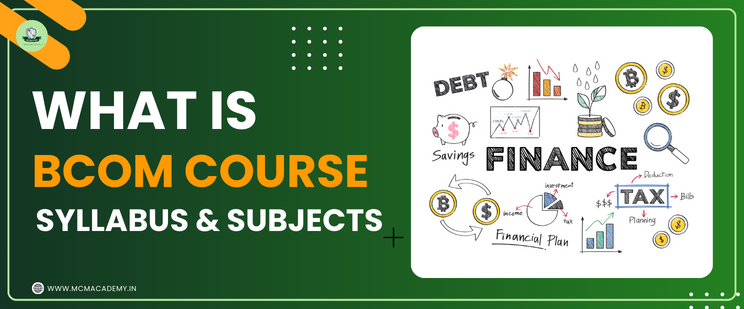A Bachelor of Commerce (BCom) degree program focuses on business and commerce-related disciplines. The BCom program, which typically lasts three years, covers a wide range of areas such as accounting, finance, economics, marketing, and business management. The program’s goal is to provide students with a solid foundation in business principles, analytical abilities, and practical knowledge that will enable them to excel in the corporate world. BCom graduates frequently pursue employment in finance, banking, accounting, marketing, and entrepreneurship. The program integrates academic knowledge with practical applications, encouraging critical thinking and problem-solving skills.
BCom Course Subject 1st Year
The syllabus for a Bachelor of Commerce (BCom) course can vary significantly depending on the university and the specific program. However, we can provide a general overview of the typical subjects and areas of study that are commonly included in a BCom course.
| 1st Semester Subjects | 2nd Semester Subjects |
| Hindi Language/General English | Hindi Language/General English |
| Environment Studies | Human Values and Professional Ethics |
| Corporate and Financial Accounting | Business Statistics |
| Entrepreneurship and Small Business Management | Business Law |
| Business Economics | Indian Banking and Financial System |
BCom Course Subject 2nd Year
| 3rd Semester Subjects | 4th Semester Subjects |
| Basics of Computers | Communication Skills |
| Income Tax Practice | Management |
| Cost Accounting | Economics Environment in Rajasthan |
| Company Law & Secretarial Management | Element of Financial Management |
| Organizational Behaviour | Advanced Accountancy |
BCom Course Subject 3rd Year
| 5th Semester Subjects | 6th Semester Subjects |
| Accounting & Business Statistics | Cost and Management Audit |
| Functional Management | Goods and Services Tax |
| Rural Development & Cooperation | Advertising & Sales Management |
| Industrial Laws | International Finance |
| Elective 1 | Elective 2 |
| Elective 1 (Student can choose any one of the following subjects) | Elective 2 (Student can choose any one of the following subjects) |
| Insurance | Auditing and Management Accounting |
| Business Budgeting | Advance Cost Accounting |
| Public Economics | Direct Tax |
Why pursue BCom Course
Pursuing a B.Com (Bachelor of Commerce) course offers a comprehensive understanding of financial and business principles. This program equips students with essential knowledge in areas such as accounting, finance, and economics. B.Com graduates often gain practical insights into the corporate world, enhancing their analytical and decision-making skills. The curriculum provides a solid foundation for diverse career paths, including finance, banking, and commerce. Additionally, a B.Com degree enhances employability and opens doors to opportunities in both the private and public sectors. Overall, opting for a B.Com course is a strategic investment in one’s academic and professional growth.
Recommended books for BCom Course
| Books | Author |
| Financial Accounting | Jerry J. Weygandt, Paul D. Kimmel, and Donald E. Kieso |
| Cost Accounting: A Managerial Emphasis | Charles T. Horngren, Srikant M. Datar, and Madhav V. Rajan |
| Financial Management: Principles and Applications | Sheridan Titman, Arthur J. Keown, and John D. Martin |
FAQs on BCom Course
What is a B.Com course?
B.Com stands for Bachelor of Commerce, a three-year undergraduate program that focuses on various aspects of commerce, business, and finance.
What subjects are typically covered in a B.Com course?
B.Com courses generally include subjects like accounting, finance, economics, business statistics, marketing, business law, and organizational behavior.
What are the career prospects after completing a B.Com?
B.Com graduates can pursue careers in areas such as accounting, finance, banking, marketing, human resources, and business management. The degree opens doors to various industries and roles.























